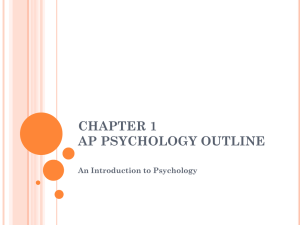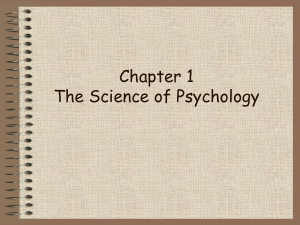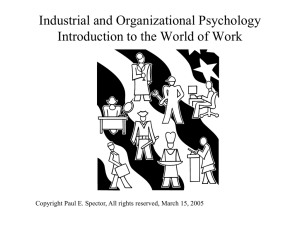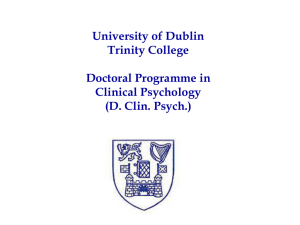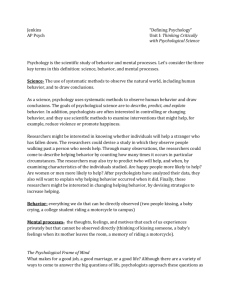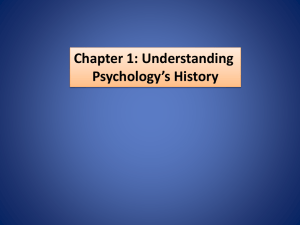psychology and behavior Analysis Lacey Seymour, Ph.D., BCBA
advertisement
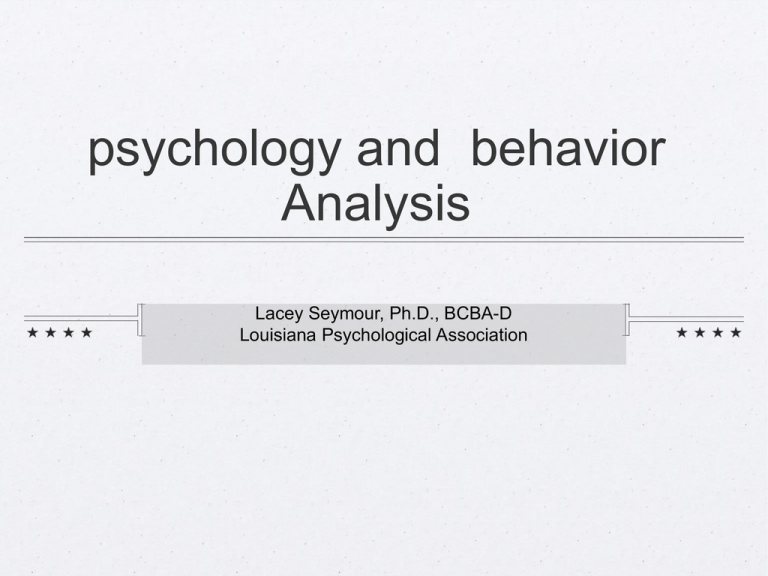
psychology and behavior Analysis Lacey Seymour, Ph.D., BCBA-D Louisiana Psychological Association Definition of Psychology Psychology is the study of the mind and behavior. The discipline embraces all aspects of the human experience — from the functions of the brain to the actions of nations, from child development to care for the aged. In every conceivable setting from scientific research centers to mental health care services, "the understanding of behavior" is the enterprise of psychologists. (American Psychological Association) Theories of Psychology Biological (focuses on physiology, genetics) Psychoanalytic (unconscious mental processes) Behaviorism (observation of behaviors, learning experiences) Experimental Analysis of Behavior (EAB) and Applied Behavior Analysis (ABA) Cognitive (mental processing of information) Sociocultural (focuses on social and cultural factors) Examination for Professional Practice in Psychology In order to become licensed to practice psychology, candidates MUST pass the EPPP which covers information from ALL of the previously mentioned theories (in addition to a wide variety of other information) Therefore, all licensed psychologists have been exposed to the principles of behaviorism NOT all psychologists who are exposed to these principles are qualified to practice them (training and supervised experience is required) American Psychological Association There are 56 divisions of the American Psychological Association. Division 25 is Behavior Analysis. Other examples include Educational Psychology, Clinical Psychology, Exercise and Sport Psychology and Industrial/Organizational Psychology. BCBA’s in LA The BACB lists 66 individuals on their registry in LA. 7 individuals are assistant behavior analysts (BCaBA) 15 of the individuals hold PhD’s in psychology (4 in other fields) Will these individuals apply for licensure through a new board? If not, what are the effects on the cost of licensure? What about the individuals with Master’s degrees in Psych? Should they be regulated by the Psychology board or another board? Who is providing behavioral services in our state? There are many licensed psychologists who are practicing behavior analysis in LA who have chosen NOT to obtain the BACB certification for various reasons (not required to practice, length of time they have been practicing, etc). Who are they and what populations do they serve? “Real Life” Examples “I use or have recently used behavioral analysis for treatment of gambling problems, geriatric selfmanagement, bipolar self-management, treatment of alcohol and other addictive drugs, depression, and chronic procrastination.” • Bill McCown, PhD • Interim Director Grad School, • University of Louisiana at Monroe “Real Life” Examples “My training in ABA was in grad school in the 60s. I used it with children, very rarely autistic, throughout my practice. I also used it extensively in group homes for individuals with mental retardation.” • Dr. Thomas J Hannie Jr. • Clinical Psychologist • Baton Rouge, LA “Real Life” Examples “I was trained at LSU Baton Rouge where our training in applied behavior analysis was extensive. I have used this in school and clinical settings for a wide variety behavior concerns. The behaviors have ranged from those related to oppositionality and attention problems to those related to more severe disorders, including autism and mental disabilities. ABA influences also effect decisions I make for typically developing children and for training appropriate behaviors to prevent the development of inappropriate behaviors. My training in this area has been applied on grant development, district, school, class, and individual levels.” • Dr. Susan Gatti • School Psychologist • Shreveport, LA “Real Life” Examples “I’ve been involved with (applied behavior analysis) extensively over the course of my career, though much less in my current position than in my previous job. Both of these have involved adult or late-adolescent brain injury rehab inpatients. Very early in my career I also worked with it in developmental disability settings.” • John Fanning, Ph.D. • Neuropsychologist • New Orleans, LA “Real Life” Examples “Applied behavior analysis was part of my doctoral training. I used this approach as the basis for developing a token economy in a residential treatment center for adolescents years ago. I also worked in a training center for intellectually disabled adults in which the entire program, designed by psychologists, was based on ABA. Since then, I have used these principles in my private practice in, among other things, devising behavioral contracts between parents and teen aged children.” • • Larry J. Benoit, Ph.D. • Clinical Psychologist • Lafayette, LA “I too was trained in Applied Behavior Analysis in the 90s, Tulane School Psychology program. Although I don’t do the intensive 6 hours of day kind of work with children with Autism, I use ABA for treatment of children who have Oppositional Defiant Disordercoaching parents using programs like PCIT. I also train teachers to use differential positive reinforcement for classroom management. Also effective for children with tantrums, school refusal, to develop school-based interventions (Functional Behavior Assessment/Behavior Intervention Plans), the list goes on. Most if not all school psychologists use ABA in their daily work. Although I’m in private practice, I continue to use these methods. I’m definitely a cognitive-behavioral psychologist, but behavior therapy is very effective for many childhood problems.” “Real Life” Examples Conclusion Because so many psychologists who are NOT certified by the BACB are using behavioral therapy, having a subcommittee under the psychology board will assist in fostering a collaborative relationship with the BCBA’s who are also practicing in this state. Working together will allow everyone involved to continue to provide valuable services to the populations mentioned above without conflict from another board.
